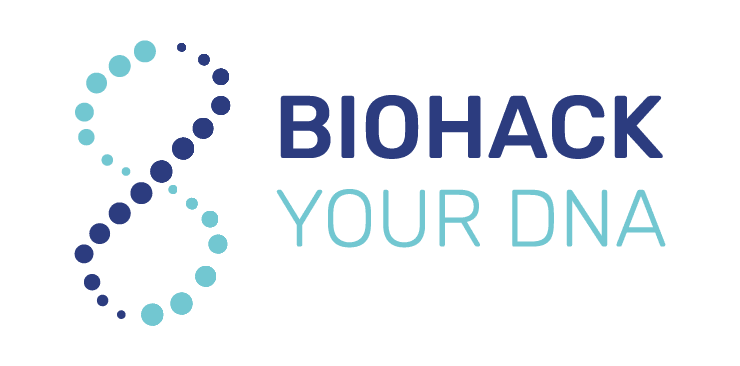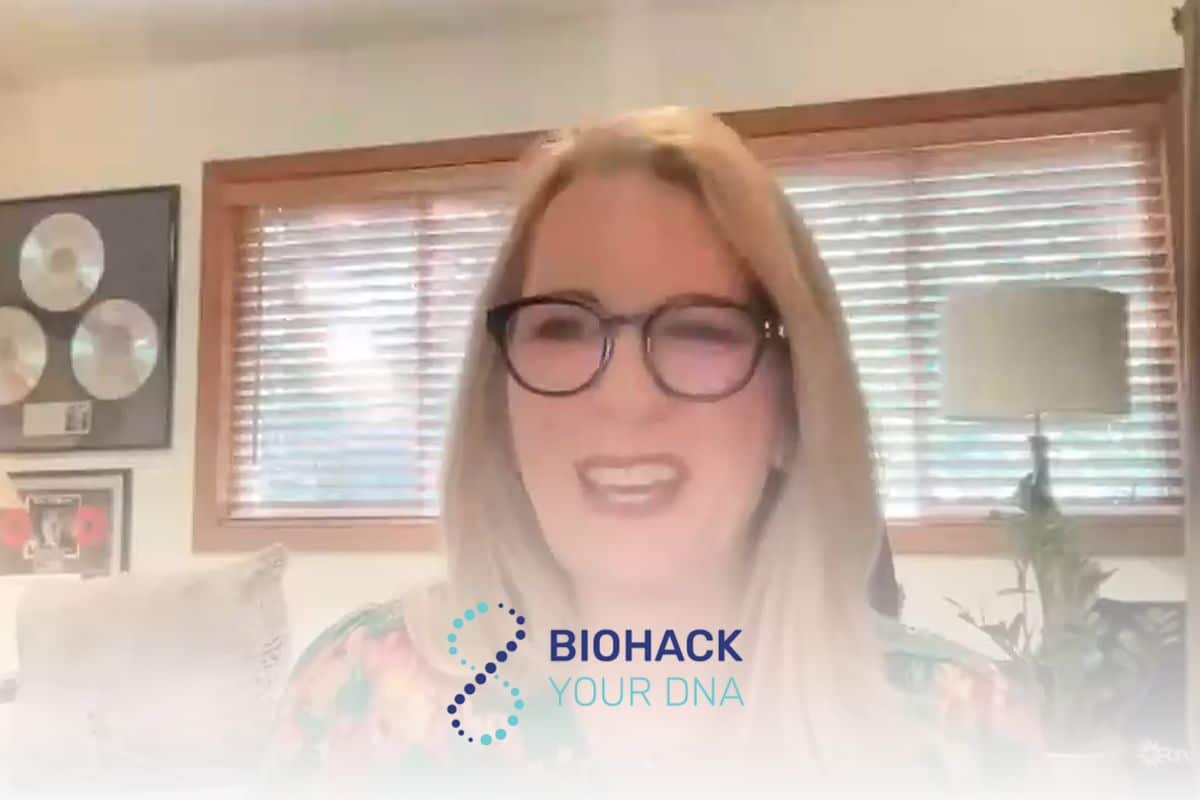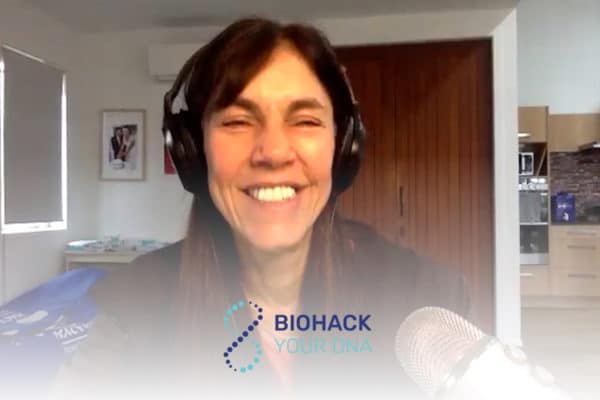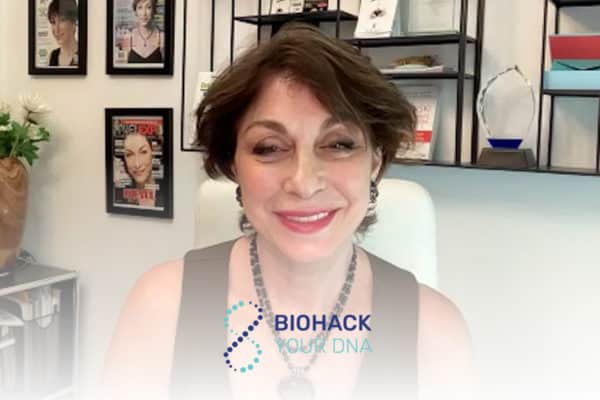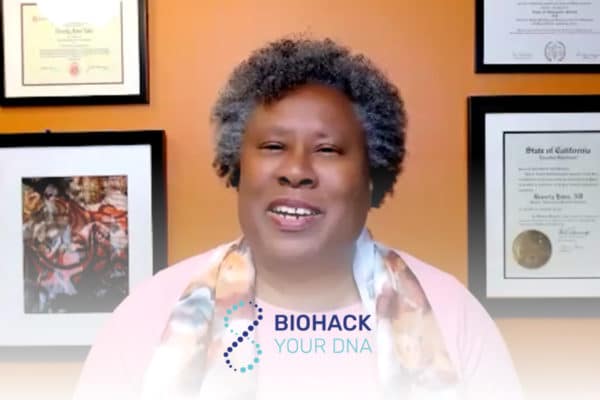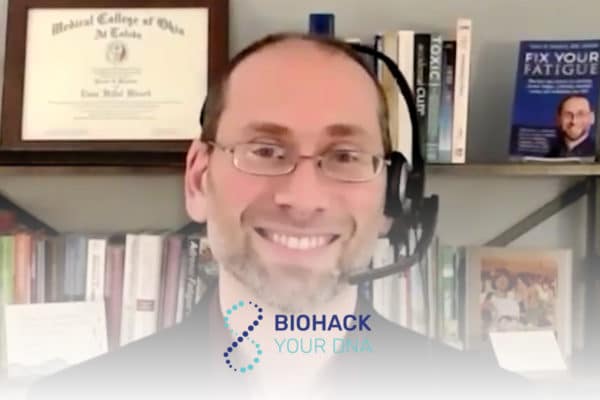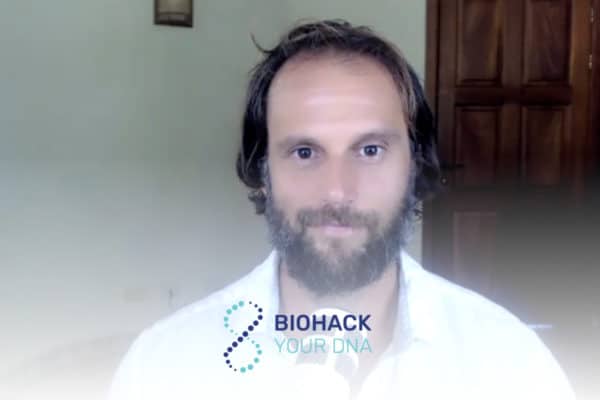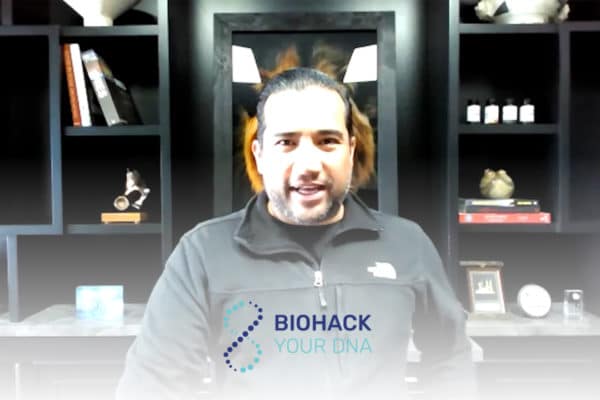Join the discussion below

Harris Khan holds a Bachelor’s of Science in Honours Biomedical Sciences from the University of Waterloo. After completing his undergraduate studies, he pursued post graduate studies in Pharmaceutical Research and Development, before gaining employment at Apotex, Canada’s largest generic pharmaceutical company, in the Formulations Development department. Harris was a key... Read More
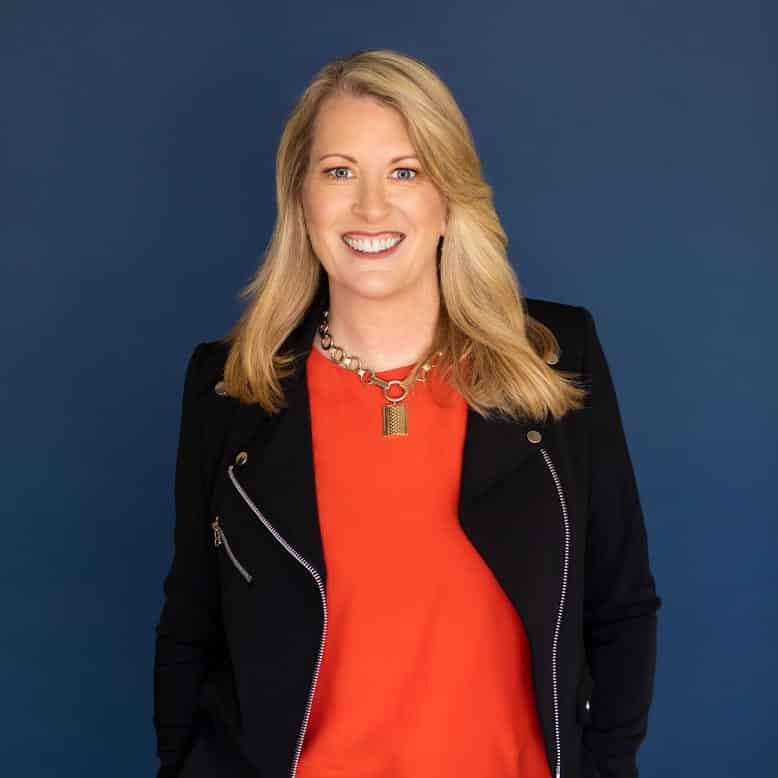
Nicole Dunn, CEO of Wellness PR Firm Dunn Pellier Media. Dunn Pellier Media helps brands to build wellness legacies in the media marketplace. They have helped wellness brands grow like P90X, OrangeTheory Fitness, F45, Club Pilates, Vega, Les Mills, Essentia Mattress, HempFusion, and more. Read More
- “I’m the CEO of a health and wellness PR firm. This DNA test didn’t just help me, it’s changed my life completely.”
- How genes influence the best diet for you, the way you deal with emotions, and how to make it a part of your life forever
Related Topics
Acid Reflux, Arguments, BioHacking, Coach, Conference, Dave Asprey, Diet, Dna Testing, Empathy, Fight Or Flight Response, Fitness, Fitness Routine, Focus, Genetic Testing, Genetics, Health And Wellness, In Vitro Fertilization, Light Sleeper, Meditation, Mood And Behavior, Noradrenaline, Pr, Rumination, Sleep, Sleep Problems, Stomach Problems, Strength Training, Structure, Super EmpathHarris Khan
Hello again, everyone. Welcome to our lecture series where we’re talking to all of our incredible clientele, some of our friends, some of the people that we’re super, super close with, and we’re really looking at DNA Company success stories. So how have these people from all walks of life really impacted their health and wellness for the better? And today, I have the wonderful Nicole Dunn, she’s a great friend. I’ve had the chance and opportunity to chat with her on a number of occasions now. I’m super, super excited to talk to her about her personal health journey. So Nicole, thank you again for doing this and welcome to the chat.
Nicole Dunn
Hi, thanks for having me. You know, I do health and wellness PR. So I’ve been working in the industry for 15 years. We have a number of brands that are really amazing. We’ve covered diet with like MyNetDiary. We’ve covered sleep with MyEssentia, fitness with Les Mills and Tony Horton and P90X, health with Dr. Mindy Pelz, you know, functional medicine, sexual health with GAINSWave. So we’ve done a lot of stuff. I’ve learned a lot about health and wellness, but what I did not know was why my health was so poor. I mean, honestly, working in health and wellness, you’d think this girl’s really healthy. Not the case. I had stomach problems probably most of my life. I was popping the pill for the acid reflux all the time. I had bouts of stomach pain. So I thought that while I was at Dave Asprey’s conference and I got the code for the DNA testing that I thought that I would finally try to get to the bottom of some of my issues. So here I am.
Harris Khan
Yeah, that’s awesome. So obviously, you know, you’re a health and wellness PR executive, obviously, you know people don’t realize that yes, we’re focused on health and wellness, we often ignore our own health because we’re pushing ourselves to the limit. What was it about the DNA testing in specific, like what did you know about DNA testing? Were you kind of on the fence about it? Were you not sure about it? Or did you feel like obviously, ’cause it was coming from Dave, someone you trusted, you were like, “You know what? This is a company that I wanna try out and really test and see what they give us.”
Nicole Dunn
Well, I actually felt like DNA was interesting to me. I wanted to know more about DNA. And I had done in vitro fertilization and so they had tested my genetic stuff for the purposes of that and that was years ago. And so I figured, you know, I’m gonna really dive into the DNA ’cause I’m interested in DNA. I think for me, there’s a couple of things that came through from the reports that really resonated with me. And you know, you cover so many things. So it’s like mood and behavior, which I would’ve never have thought would’ve been in my DNA like structure. And so that, to me, that was one point that was interesting. Also the diet and the sleep. I really wanted to know more about that. And my fitness.
As you know, you know, I’ve represented pretty much every brand from P90X to Pilates, to Orangetheory Fitness, to whatever. And I’ve done all those workouts, but never really found a workout that’s really right for me. And when we were talking, you said, “Nicole, you should be doing strength training.” And since I started doing the strength training, I’ve felt a lot better, my stomach has felt a lot better. But I’d say, you know, in general, I was very interested in DNA and my own DNA as a person.
Harris Khan
That’s awesome. So, you know, let’s dive in, right? Let’s talk about some of the interesting things you’ve learned. You mentioned mood and behavior. You know, mood and behavior, we always like to say like this is sort of the entry into your mind, right? When you, everyone, I would say, has a pretty good intuition about how their mind works. They know that they are a certain way, maybe they just don’t know why it happens. And one of the things we’ve been able to do with the genetics is kind of answer the question of the why. So tell us a little bit about the things that you learned that maybe you were like, “Oh, that makes sense. Now I know why.” And then maybe some things that surprised you about the DNA when it came to your mood and behavior.
Nicole Dunn
Yeah, I’d say the first thing was that I’m predispositioned to excel in reward-based oriented careers. So that’s anything like sales, business development, entrepreneur, and you know, I was a former TV producer that kind of swapped over and started doing PR and I wanted to do something meaningful to help people live happier, healthier lives. And I was doing the PR every day and I liked it, I just didn’t love like, I mean, I love health and wellness. And so that, to me, was really interesting. That was the first thing that was on the report was that I was predispositioned for those careers.
And once I started doing business development, I fell in love. I’m like, “I love this. I love people, I love talking to people.” Second thing was I am the type of person that I need a lot of focus. But it has to be in short bursts. Like I cannot sit down for like eight hours and just continue to work. So the report also mentioned that, which I was like, “Really? That’s strange, but it makes a lot of sense.” And then the last thing was really, I don’t get in a lot of arguments, but when people say things, I’m intently listening. And one of the things is that I, more so than the average person, will think about those thoughts over and over and over again. And it can be something really silly. Like someone says something like, “Oh, well, you know, you wouldn’t know how to be a mom.” And I’m like, “Wait, what?” And then I start thinking about, you know, because I don’t have children, they weren’t meaning in a bad way, but you know, then I start thinking about it. And then when I go to sleep, I can’t sleep because I’m thinking about that thought. And I’m like, “What could I have said to that person?” And so that was one of the things that I was really surprised about. And you could probably give more insight into that specific-
Harris Khan
And it’s so funny, you know, it literally comes down to how do we, as individuals, attach an emotion to a memory, an event, or a task, right? And so some of us, I always give this example of, you know, we’re walking down the street and you hear a dog bark. And so you turn around to face the dog and, you know, things happen in your body physiologically. You were surprised by it and so your fists clench and your heart rate increases and your pupils dilate, and you’re like, “Okay, am I gonna fight or flight this dog,” right? “I’m gonna figure out what I gotta do.” And most people, when they realize that there’s a cage in front of the dog and there’s no crisis, then you’re like, “Okay, crisis averted,” they calm down and they move on with the day.
But for some people, literally because their receptor for that kind of, you know, that fight or flight response is staying on for a longer period of time because of a genetic variation, they bind their noradrenaline, that’s like fight or flight response transmitter, they bind to it a longer period of time. And so these are your people, they stay in that emotionally charged state for a little bit longer than the average person. And so that plays out in different aspects of their life. You know, they are more likely to, you know, they’re great empaths. So you’re probably a fantastic, you empathize really well with others.
But as they say, you may empathize a little too well, where their struggles, their negativity, might kinda leak over into your life. And you’ll be like, “No, I think, you know, my friend told me this,” and like, you’re sitting there thinking about, “Man, that’s tough,” and that’s impacting you. So you have this superpower of being a super empath, but that can also bring, you know, present its own challenges and that leaks into things like sleep, right? So you mentioned that, you know, for you, your sleep problem is not like everyone else. It was specifically over the fact that you ruminate, you’re a ruminator, you think about things at night and try to figure out the hypothetical ways that conversation gone.
Nicole Dunn
But I’m also a light sleeper, so that was one of the other things that came through on the DNA report was that I can be a, you know, waken up really easy and I can awake very easily. And, you know, and this is true. Like last night, I just couldn’t sleep. The air conditioning’s broken in our house. And all I could think about was the air conditioning’s broken, I’m sweating, I’m hot. And you know, then I wake up and then it’s hard for me to fall back asleep. So that was interesting. And then the thoughts and struggling to get back to sleep. And I think that’s my biggest problem of even trying to get some deep sleep so that I can have a productive day, you know?
Harris Khan
That’s awesome, I mean, now that you’ve known, you know, you’ve learned these things, what have you started to implement right away in terms of, especially on the mood behavior aspect? How do you manage some of those tendencies?
Nicole Dunn
Well, you know, I have a coach, number one. So my coach has helped me to coach some of those things, you know, the little things that I don’t need to worry about in my life. And the second thing would be meditation. Every day, I do meditation. So twice a day, once in the morning, once in the evening. I try to do 15 minutes. I think that that’s a good amount of time to really just think of nothing. I mean, of course you’re thinking of things and they come in and they go out. My meditation teacher was, of course, Emily Fletcher, who’s an amazing woman. And she said, “Those thoughts are just gonna come in, but then you just let ’em go out.” And so I’ve done that. I’ve also changed my fitness routine. And that was the other interesting aspect of the test that we kind of went over in London.
And, you know, I really feel like I have done so many workouts, but yet never found the one that really makes me feel good. And you said to me, “You need to do strength training.” And I started doing the strength training when I came back from London and I feel fantastic. I actually missed my day yesterday because I had too much going on and I felt restless about it. I was like, “Oh my God, I gotta get to the,” you know, and it just didn’t happen. But I think, for me, you also suggested more mindfulness techniques, which I was implementing, but I’m now doing more of that. I’d like to incorporate breathwork ’cause I think you said that was really important for me. And then using a sauna, I really know the benefits of like an infrared sauna, that kinda stuff, and practicing intermittent fasting, which I have not done yet. I have a consultation with my client for a session to learn about intermittent fasting, Dr. Mindy Pelz. And that’s, I’m definitely going to try it. I like food, and that’s the other thing, I like to snack. And you said, “Are you a snacker?” And I said, “Yes.” “Oh, that’s in your DNA too.”
Harris Khan
Yeah, yeah, and it’s in, you know, and we’ll get into a little bit of the details there, but I wanna really touch on one point that you made that’s super important that people need to understand. And that’s the value of having a coach. You know, people think, “Oh, do I need a coach or not?” That coach that you end up bringing in, you know, we do a lot of behavioral change coaching. We teach clients sort of how to implement. Having a coach is, it’s an accountability factor. It’s like, “Hey, I’m accountable to someone.” ‘Cause when people try to be accountable to themselves, they let themselves off easy, you know what I mean? “Well, you do really need to go,” and you’re kind of convincing yourself. But when you’re accountable to someone, you’re like, you know, “People are relying on me,” or “I’m expected, I don’t wanna let anyone down,” and that, psychologically, can be very influential in some of our decision making.
So good on you for really identifying and bringing that coach in because, to your point, in your genetics, you will do better with a coach. When you have someone you’re accountable to, you’re more likely to be like, “No, I’m accountable to this person.” So that’s wonderful. Now, you know, diet, right? So we really love to, people always, when they think about diet, they’re thinking, “What do I eat?” That’s the first question they ask. Well, diets go beyond what you should eat. And your nutrition profile, I don’t like to use the word diet because diet means it’s temporary. But what we’re trying to teach people is how do you change the way you eat as a lifestyle? This is gonna be how you’re gonna eat for the rest of your life. So a person like you, when you’re exploring intermittent fasting, because of your snacking, most people, when they do intermittent fasting, they’re eating once in whatever their first meal is and they eat a second meal.
But a person like you might actually end up doing four or five small meals to address the snacking component just within the eight hours that you’re allowed to eat. Do you know what I mean? So that way, you address the snacking, but you’re also being able to find that sort of 16 hour, you’re putting the sleep into it as well. And obviously, when you meet with Dr. Pelz and whoever your functional medicine practitioner is, those are some of the things that are influenced by genetics. Should I start in the morning with my first meal or do I skip the evening meal, right? That’ll come down to sort of your factors. So really, really interesting. And I’m so proud that, you know, you’re out there, you’re lifting your weights and you’re doing your mindfulness meditation, because guess what? And I’m sure you’ll agree with this. It’s the knowledge that you understand why I’m doing it that’s driving the compliance. “No, no, no, I like, I know, based on my genes, like strength training’s great for me and holy crap, I feel great.” So like, you know what I mean? It’s kind of that like reinforcement, so that’s wonderful.
Nicole Dunn
And I think to the last point, would be, regarding the diet and the foods, is when I’m a snacker, I’m eating good foods. I mean, I’m eating like an apple with like a piece of goat cheese or things like that. But I’m doing it throughout the day. Like I’ve already had one snack before this call and probably after this call I will go and just get, you know, nibble a nibble. So I wanna explore the fasting to take me to, because I think that’s really gonna help the stomach as well. You mentioned whole foods, you mentioned the foods that were really good for for my genetic makeup. A lot of fiber, broccoli, mushrooms, spinach, bananas, like things like that. I was not eating.
So I am definitely eating more whole foods. I’ve eliminated all kinds of sugary, snacky things. Pretzels were my favorite, like that kind of stuff. So I think in, all in all, you have to look at sort of that food and then look at, well, what’s my pain threshold right now? Like how much pain is my stomach in? It’s very low with the whole foods. If I eat the wrong food, and I’ve done elimination diets. Dr. Bill Cole has a great elimination diet called the AIP, which is Autoimmune Protocol. And you really eliminate everything to figure out what is it that’s really bothering you. I noticed that nuts, when I eliminated nuts and I tried to reenter the nuts back in and my stomach was like, “Uh uh, we ain’t doing that.”
Harris Khan
And you bring up such an important point. It’s going to be different for everyone. Not everyone is gonna know what their inflammatory trigger is, but the fact that the genetics point to a susceptibility inflammation is cause enough to be like, “You know what? I need to step back and figure out, in my diet, my lifestyle, my environment, what is it that’s causing it?” For you, it’s nuts. For someone else, it might be eggs. For someone else, it might be dairy or gluten, right? We know that whole foods are great, but for some people, for example, nightshades are very inflammatory. So things like that eggplant, bell peppers, tomatoes, people don’t do well with it. And then not that it, in and of itself, it’s a healthy vegetable. It’s just not the healthy vegetable for you. So we’re gonna find another way to support you. And that’s part of the beauty of genetics is being able to kind of get really personalized, individualized, to identify what works for you.
Nicole Dunn
‘Cause you also mentioned something in my DNA about prediabetic, like I could be prediabetic, right?
Harris Khan
So there is a tendency in your genome for insulin resistance. And what that means is, you know, you eat something sugary and it goes into your bloodstream but guess what? The signal for the body to release insulin, that’s the hormone that takes the sugar and puts it into the cells, well that, they didn’t get out enough, you know? They’re snoozing the alarm, right? So alarm’s going off, you’re snoozing the alarm. And so over time, anything that’s high in sugars, high in calories, high in carbohydrates, that can trigger that sort of elevated blood sugars. And over time, elevated blood sugars are a root factor of type 2 diabetes. Now what’s important for you is, based on that information, you know when you shouldn’t be eating is later at night because that’s when metabolic dysfunction is worse. You can have more metabolic dysfunction. So we talked about your evening meal, if you’re gonna do it, is very, very specific. It’s lean protein and it’s those complex carbohydrates, green leafy vegetables, really dealing, you know, removing the sugar and the fat consumption later on at night, so.
Nicole Dunn
Yeah, I thought that that was super interesting. And ’cause I was like, “Oh no,” when you said it and then, but it is, you know. I am trying to eat my meals before six o’clock because I feel like it hits seven and then you’re in bed at nine or 10, your food doesn’t have time to digest. And also, that has an effect on me as well. And the nightshade thing is big as well. I feel like anytime I eat any of those foods, they really hurt my stomach and I’m struggling. You know, and sometimes I slip up, sometimes I want a little, little something or a little macaroni and cheese and I’m like, it was so good, you know, that little bite that I had. And then the next day I’m like.
Harris Khan
Yeah, and that’s, again, it’s important. Remember, we don’t want to build a plan, especially for people with your profile, like for you, that diversity is important, that happiness of food is important. If you tell someone like you that “Hey, you gotta eat boiled chicken and broccoli for the rest of your life,” like it’s just not gonna be a sustainable diet for you. Like you have to understand that sustainability is more important than being that rigid structure, especially if you’re not a person that already thrives in rigid structures, it’s gonna be difficult. So again, it’s about not just what you eat, but how you’re eating it, when you’re eating it, where you’re eating it, why you’re eating it. Those are all important questions that the genetics helps answer. Nicole, you’ve been wonderful so far. Thank you so much, I appreciate, you know, sort of sharing your genuine, true experiences with us. And what would you leave listeners here who perhaps have never taken the test or are considering it, what’s the kind of parting words you’d want for people who are listening to this?
Nicole Dunn
Well, I really feel like if you wanna learn about your body and your DNA and your structure and what’s gonna work for you, this test is for you. I think a lot of people wonder, and then they have problems, then they go to doctor, to doctor, to doctor. I would start here because then you can learn the basic genetic stuff that might be your triggers, right? And then you can go out and then address them, you know, with some of the DNA data that you get back. I mean, for me, look, you’ve got all the buckets covered. You’ve got the mood and behaviors, you’ve got the diet, you’ve got sleep, health conditions, the workouts, those are the five key essential things that every person thinks about and wants to do better at, wants to improve. So I would say if those five, if anything in those five categories is, you know, bothering you or you need to improve upon, then you’ll have the insight to be able to then go out and find a solution and really start working on implementing some of those into your, you know, daily routine.
Harris Khan
Yeah, wonderful. Thank you so much for your time, Nicole, I appreciate-
Nicole Dunn
You’re welcome.
Harris Khan
Your wealth of experience and knowledge. And for those who are listening, tune in next time, we’ll be doing this with a number of people. So we look forward to sharing more success stories, more insights, on the power of DNA and functional genomics. Thanks again, everyone, take care.
Downloads
